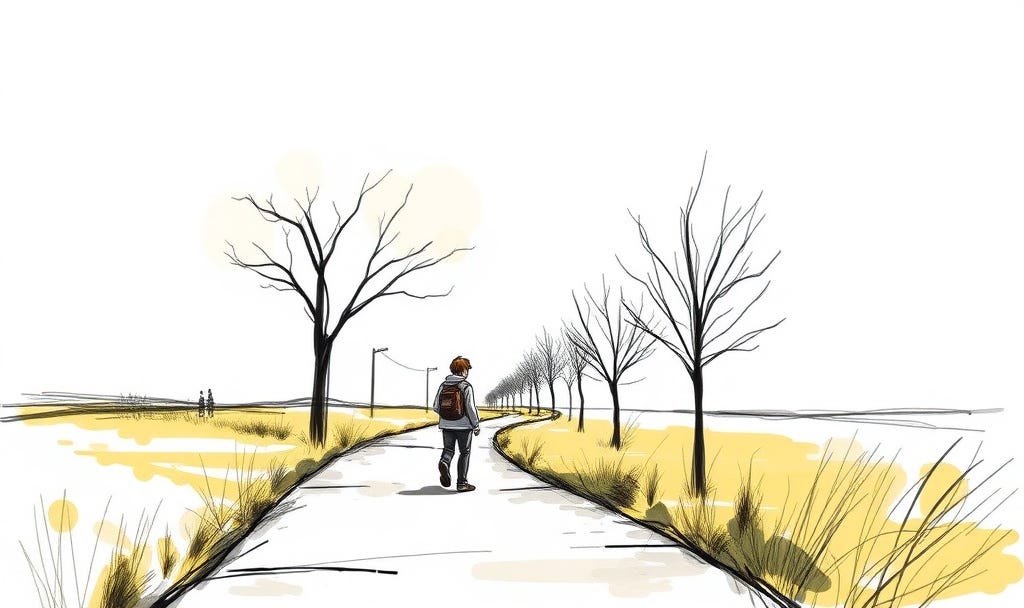Thirty Minutes, No Phone
Airplane mode for your mind.
I did something tiny last week that felt…awkward. I left the house for a 30-minute walk without my phone.
No earbuds.
No podcasts.
No “let me just check one thing.”
Just my feet, the sky, and a twitchy thumb that kept reaching for a ghost.
The first five minutes were hilarious. My hands didn’t know where to live. I kept patting my pockets like a nervous traveler. Then the world got louder—in a good way. I heard a lawnmower somewhere far off—a kid arguing with his scooter. I wasn’t trying to be mindful. There was simply nothing else to listen to.
Around minute ten, the negotiations started.
“You should be answering emails.”
“What if someone needs you?”
“This is a waste of time.”
Under that noise sat the real thing: I wasn’t exhausted from work, I was exhausted from constantly switching. With no phone, the doors stayed shut. My mind finally sat down like a child out of excuses.
By the last stretch, something easy returned—clear next steps.
Which meeting to decline?
That I should text a friend who’s gone quiet.
The walk became a calm meeting with myself, the kind you never schedule because it looks like “nothing,” and yet it fixes everything.
I came home feeling normal. Which, these days, counts as a minor miracle.
Here’s why this silly little walk helps me:
It turns down the volume.
No notifications = no micro-adrenaline. Most of my “overwhelm” isn't about the size of my to-do list; it’s about the constant starting and stopping. When the noise drops, my shoulders do too.
It washes off residue.
A phone-free walk is a rinse cycle. I come back lighter, and the next task doesn’t feel like pushing a truck.
It gives boredom a job.
Boredom isn’t the enemy; it’s compost. Leave it alone for 30 minutes, and it feeds the next idea without any effort.
It resets rewards.
The phone shoots fireworks; outside is a steady lamp. After a quiet walk, regular work feels doable again. I don’t need a dopamine blast to begin; a match will do.
It reminds me I’m in a body.
Eyes are looking farther away than 6 inches from a screen. Air in the lungs. Feet on actual ground. Basic maintenance, somehow easy to forget.
Since then, I’ve started doing this two or three times a week. Nothing ceremonial. Sometimes it’s just a loop around the block.
Side effects I like:
Mornings feel less brittle. I don’t shatter at the first surprise.
I start faster. Less bargaining with myself to begin.
Writing is cleaner. When I’ve already heard my thoughts outside, they land better on the page.
Evenings are calmer. I’m less hungry for screens because I’ve already had a slice of quiet.
If you want to try it, keep it simple:
Leave the phone at home (or bury it in airplane mode).
Walk a route you don’t need to think about.
Carry one question: “What am I avoiding?” Don’t force an answer. Notice five things—sound, color, smell, texture, temperature.
When you get back, do one clear action: send the email, decline the meeting, write the first line. Let the walk pay for itself.
That’s it. No challenge. Just one 30-minute window where the world doesn’t get first dibs on your attention.
If you see me outside looking slightly confused, I’ll probably notice you this time.
P.S.: My inspiration to write this one came from Walk 30 minutes without your phone written by




This really is a big deal. It’s scary how attached our mental state has become to our phones. Myself included. I think we’ve already created a type of dystopian phenomenon with this.
I tried a day off yesterday - the amount of time you catch yourself thinking or reaching for your phone in the first few hours is laughable. But then something clicked and I forgot about it for a few hours. Everything felt a lot more quiet and real. With some dedicated effort, there’s a way for us to break away from these habits we’ve formed over the last decade